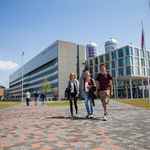Scientific Outreach Workshop
- Date
- 4 June 2024
- Time
- 15:00 -17:00
- Location
- Science Park 904
- Room
- C1.110
First, Bob Hoogendoorn (KNGMG) will give an interactive talk on the subject, and then there will be a panel discussion with outreach experts from different fields and career stages. This will be followed by drinks & snacks in the IBED common room.
“Outreach is an important part of research. Showing societal relevance and engaging with the general public presenting results of your studies. Any outreach project will help to build indirect and direct support for science in the broadest sense. However, scientists are not trained to do this type of work and are not always stimulated to do this. Therefore, they can be hesitant to develop their own outreach project. While I see that there is enormous potential for earth sciences to capture the imagination of the public. In addition many students and staff are passionate about their work and show eagerness to share their knowledge. I would like to present several examples of outreach I have been involved in. Including Spiegelzee and Olivine Tree projects. Sharing my experience, positive and the hard lessons I have learned. There will be time to discuss the necessity for outreach and to explore how you can develop your own initiatives.”
Dr. Bob Hoogendoorn is an alumnus of the UvA Physical Geography faculty graduating in 1996, after which he did his PhD in Delft at the department of Applied Earth Sciences. His field of research was on the effects of sea-level change on delta’s. This lead him to work at Deltares where he lead several departments and research programs. Currently he works at KPMG at their sustainability department. He is the President of the Royal Geological and Mining Society of the Netherlands (KNGMG).
These are the panellists:
Bart Hoekstra
“I’m a PhD candidate in radar aeroecology, working on bird migration mapping and forecasting for nature-inclusive wind energy in the Netherlands. My work fundamentally involves a lot of collaboration with stakeholders (governments, NGOs), so naturally there is a need to translate all of my work to a non-scientific audience. Luckily, I love doing that and find it super important to show the relevance of my research. Besides the things I do directly for my PhD work, I do a lot of voluntary ‘outreach’, such as NEMO kinderlezingen, lectures for general audience and citizen scientists about ‘radars & birds’. In my free time I run a volunteer-based bird migration monitoring project in Georgia (the country), the Batumi Raptor Count, which is globally recognised as one of the ‘gold standards’ in this field. Working on that and being primarily responsible for monitoring and communications, gives me a lot of opportunities to creatively play around with different ways/formats of outreach. I have a background in design and (visual) communications, which is naturally useful doing any SciComm.”
Justin Stewart
“My research focuses on the biogeography and symbiosis of microbiota and plants with Toby Kiers and James Weedon at Vrije Universiteit Amsterdam for my PhD. On the Dutch MICROP project, I investigate the evolution of cooperation between bacteria and fungi living on the root systems of diverse plant species under stress. What is novel here is that a phylogenetic approach is taken, to identify if a core group of microbes are recruited to plants under stress. To this effort a high-throughput root imaging platform was developed to facilitate sampling over 500 plant microbiomes without disturbing the rhizosphere microbiota communities.
I am a data scientist at the Society for the Protection of Underground Networks (SPUN). Here I focus on machine learning algorithms of global maps of mycorrhizal fungal diversity. Currently I am leading a global sampling campaign to groundtruth and validate model predictions in the world’s least studied ecosystems including the Amazon Rainforest, Galapagos Islands, Parámo grasslands, Khazak Steppe, and Tien Shen mountains. My research has been covered in news outlets including the BBC, The Conversation, and Discover Magazine. I also engages in artistic collaborations with Amsterdam based InsideOutside studios, The Dutch National Opera, and Waag FutureLabs.”
https://www.thecrobe.com/media
Antonia Praetorius
“I am an environmental chemist studying the fate of emerging contaminants in the environment. I combine modelling, experimentals and citizen science to assess the release and fate of anthropogenic chemicals and materials in surface waters and soils. I enjoy working in interdisciplinary teams and am interested in chemical risk assessment and regulation.
Here is the website from our citizen science project, related to which I have had most outreach/media exposure: https://www.meta-citizenscience.nl/. There is also a tab with some news items, but in the meantime I have been invited to talk about our citizen science project at an event called TexTalk in Tilburg a few weeks ago: https://www.instagram.com/textalk.tilburg/.“
